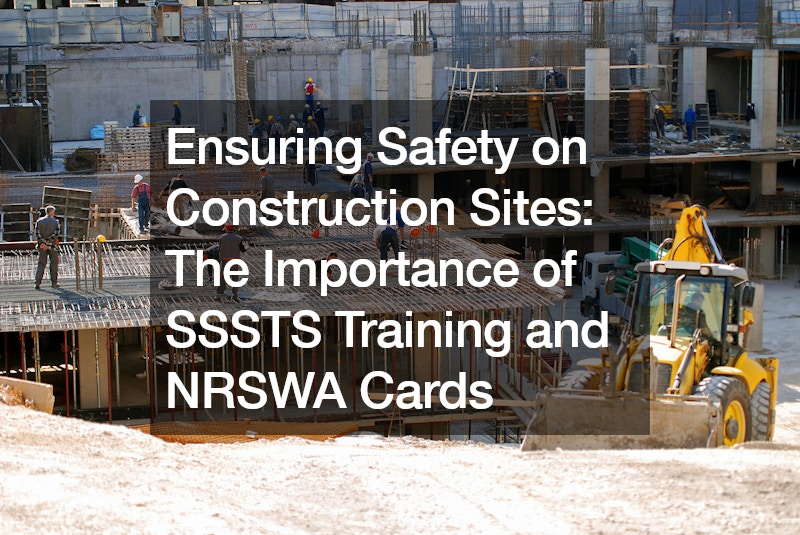

Construction sites are inherently hazardous environments, with numerous risks that can endanger workers. Proper training and certification for supervisors are essential to mitigate these dangers and ensure a safe working environment. The Site Supervisors; Safety Training Scheme (SSSTS) and possessing NRSWA cards are crucial to achieving this goal.
Understanding SSSTS Training The Site Supervisors’ Safety Training Scheme (SSSTS) is a comprehensive two-day training program designed specifically for construction site supervisors. This course aims to equip supervisors with the knowledge and skills necessary to maintain a safe working environment and comply with legal responsibilities.
Key Components of SSSTS Training Legal Responsibilities: One of the primary focuses of the SSSTS course is to educate supervisors on their legal responsibilities under the Health and Safety at Work Act 1974 and other relevant legislation. Understanding these legal obligations is fundamental to ensuring supervisors can effectively manage site safety and avoid legal repercussions.
Risk Assessments: Supervisors are trained to conduct thorough risk assessments. This involves identifying potential hazards, evaluating the associated risks, and implementing measures to mitigate those risks. Effective risk assessments are the cornerstone of proactive safety management.
Safe Work Practices: The course emphasizes developing and implementing safe work practices. Supervisors learn to establish protocols to prevent accidents and injuries, particularly in high-risk areas such as working at heights and handling electricity.
Common Hazards: Understanding common construction site hazards is essential for any supervisor. The SSSTS course covers a range of hazards, including falls from height, electrical risks, and machinery-related dangers. By recognizing these hazards, supervisors can take steps to protect their teams.
Communication and Supervision Effective communication and supervision are critical elements in maintaining site safety. The SSSTS training highlights the importance of clear communication between supervisors and workers. Supervisors learn strategies for effective oversight and how to provide the necessary training and guidance to their teams. This ensures that all workers are aware of safety protocols and can operate safely on site.
Incident Management In the event of an accident or near-miss, proper incident management is crucial. The SSSTS course trains supervisors on how to investigate accidents, report incidents accurately, and implement corrective measures to prevent recurrence. Understanding the role of the Health and Safety Executive (HSE) and how to collaborate with this regulatory body is also a key component of the training.
The Role of NRSWA Cards While SSSTS training is vital for general site safety, NRSWA cards (New Roads and Street Works Act cards) are equally important for street and public road project supervisors. These cards certify that individuals have the necessary training and competence to perform street works safely and comply with legal standards.
Importance of NRSWA Cards Legal Compliance: Possessing NRSWA cards ensures that supervisors and workers comply with the New Roads and Street Works Act. This legislation sets out specific requirements for street works to minimize disruption and ensure safety. Holding NRSWA cards demonstrates a commitment to adhering to these standards.
Specialized Training: The training required to obtain NRSWA cards focuses on street works’ unique hazards and safety protocols. This includes knowledge of traffic management, safe digging practices, and the correct use of equipment. Specialized training is essential for minimizing risks in public road environments.
Enhanced Safety: Construction companies can significantly enhance site safety by ensuring that all personnel involved in street works hold NRSWA cards. These cards verify that workers are trained to handle the specific challenges of street works, reducing the likelihood of accidents and injuries.
Benefits of SSSTS Training with NRSWA Cards Combining SSSTS training with possessing NRSWA cards offers several benefits for construction site supervisors and their teams.
Comprehensive Safety Management: SSSTS training provides a broad understanding of construction site safety, while NRSWA cards offer specialized knowledge for street works. These certifications enable supervisors to manage safety comprehensively, regardless of the project type.
Increased Credibility: Supervisors with both SSSTS certification and NRSWA cards are viewed as highly competent and credible. This can lead to greater trust from workers, clients, and regulatory bodies, fostering a culture of safety and compliance.
Reduced Risk of Incidents: Supervisors are better equipped to prevent incidents with thorough training in general site safety and specialized street works safety. This leads to fewer accidents, injuries, and associated costs, contributing to a more efficient and effective work environment.
Legal and Regulatory Compliance: Adhering to legal requirements is crucial in the construction industry. SSSTS training and NRSWA cards ensure that supervisors are well-versed in the relevant laws and regulations, reducing the risk of legal issues and penalties.
Conclusion Ensuring safety on construction sites is a multifaceted challenge that requires comprehensive training and certification. The Site Supervisors’ Safety Training Scheme (SSSTS) provides supervisors with the necessary skills to manage site safety effectively, while NRSWA cards certify competence in street works. By combining these certifications, supervisors can create a safer working environment, comply with legal requirements, and enhance their credibility. Investing in SSSTS training and obtaining NRSWA cards is essential for any construction company committed to protecting its workers and maintaining high safety standards.
.






